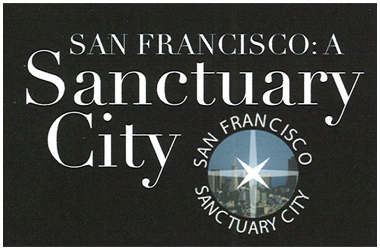Monday, September 25, 2017

Ana Herrera, Niloufar Khonsari, and Esperanza Cuautle discussed the federal government’s immigration policy and resistance to it at the local level. Ana is the Managing Attorney of the Deportation Defense and Legal Advocacy Program at Dolores Street Community Services, a multi-dimensional housing and social services organization. The Deportation Defense and Legal Advocacy Program provides legal representation to low-income immigrants, including those facing deportation, and works to increase the collective power of the city’s immigrant communities. Niloufar Khonsari founded Pangea Legal Services in 2012 to provide legal representation, community empowerment, and policy advocacy for low-income immigrants who face deportation and may have lawful avenues to legal status. Nilou serves as the executive director of Pangea as well as a staff attorney there. Esperanza Cuautle works at Pangea, particularly in its community empowerment activities.

The panel addressed several aspects of this broad and rapidly changing area.
Nilou spoke about the Trump administration’s evolving “travel ban,” which she said remained a “Muslim ban.” She described ongoing efforts to challenge the new version as unconstitutional.
Nilou and Ana talked about the day-to-day deportation-defense work their agencies do. Nilou said there are 40,000 cases pending in Immigration Court in San Francisco and only 15-20 judges to handle them, though more will be coming. It can take six to nine months for a person who has been detained to get a hearing in San Francisco, even though that case is a relatively high priority. Nilou said many of Pangea’s clients are seeking asylum. One was a single mom with a 7-year-old boy. She was detained after cashing a bad check she got as payment for housekeeping work. She was married to a man who abused her. She demonstrated grounds for relief and eventually got a green card. Nilou said that such cases were far more representative of undocumented immigrants than the highly publicized and politicized cases such as the killing of Kay Steinle on Pier 14. Nilou called that case “one in a million” and cases like that of the housekeeper “the million.”

Ana noted that three million people were deported in the eight years of the Obama administration. She said President Trump promised shortly after he was elected to deport two to three million (though he did not say in what time period). Nilou said the United States has the largest immigrant detention system in the world, run predominantly by private companies. She said the government spends more on immigration enforcement than on all other federal enforcement agencies combined. Ana said the federal government has a quota of 34,000 beds to be kept filled with persons who are under deportation proceedings. As a result, some 400,000 persons are incarcerated each year for immigration violations. The detainees are held in facilities run by private, for-profit companies or in county jails, at an aggregate cost to the public of $2 billion a year. The detention facilities are often located far from the immigrant’s residence, and conditions in the facilities are difficult at best. Ana spoke of a client who fled domestic violence in Latin America and remained 14 months in a federal detention center rather than return home, even though her cellmate was a murderer.
U.S. Immigration and Customs Enforcement (“ICE”) is the federal agency charged with enforcing the nation’s immigration laws. Arrests by ICE agents increased 38% nationwide in the first three months of the Trump administration. Nilou said ICE routinely violates the Constitution by conducting raids that amount to unlawful searches and seizures. She said that ICE agents have a valid warrant in only 1% of their raids. The Fourth Amendment (prohibiting unlawful searches and seizures) and the Fifth Amendment (guaranteeing due process, among other things) explicitly apply to all people in the U.S., not just to citizens and legally documented residents.

Esperanza spoke about the ways that San Francisco residents can help the immigrant community. One way is to report and monitor ICE raids.
Deferred Action for Childhood Arrivals (aka “DACA” or the “Dream Act”) is a program instituted by executive order in the Obama administration under which some persons who entered the country without proper documentation as minors can register to defer deportation for renewable two-year periods and can receive work permits. There are some 800,000 such people (so called “Dreamers”), roughly a quarter of whom live in California.
Esperanza is one of them. She described how greatly DACA status has helped her.
On September 5, 2017, President Trump ordered an end to the program, claiming in part that the Obama administration lacked the authority to issue the order that established it. Under the Trump administration’s rescission order, “Dreamers” whose legal status expires on or before March 5, 2018, would be able to renew their two-year period of legal status if they applied by October 5, 2017. Others would be subject to deportation unless Congress authorizes the DACA program.
Esperanza was one of several “Dreamers” who on September 18, 2017, disrupted the news conference of House Minority Leader Nancy Pelosi to protest a reported deal between President Trump, Pelosi, and Senate Minority Leader Chuck Schumer whereby Congress would authorize the DREAM Act while increasing funding for “border enforcement.” Esperanza said she lacked confidence that Pelosi could be “our champion.”

Our meeting occurred shortly before Governor Brown signed legislation making California a “sanctuary state.” A day after the bill signing, the Acting Director of ICE issued a statement in which he claimed, among other things, that the newly enacted state law “will undermine public safety and hinder ICE from performing its federally mandated mission.” The statement also said that “ICE will have no choice but to conduct at-large arrests in local neighborhoods and at worksites. . . .” Having instituted policies under which city officials do not cooperate with ICE, San Francisco was already a “sanctuary city.”